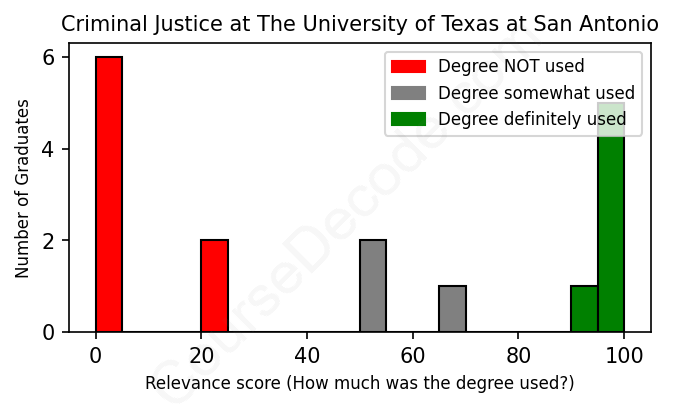
First, some facts. Of the Criminal Justice graduates from The University of Texas at San Antonio we've analyzed , here's how many have used (or NOT used) their degree in their career:

These are estimates based on AI analysis of 17 LinkedIn profiles (see below).
The verdict? Bad. Overall, with an average relevance score of 46%, Criminal Justice graduates from The University of Texas at San Antonio have a substantially lower likelihood (-21%) of finding work in this field compared to the average graduate across all fields:
And for comparison, here's the chart for all profiles we've looked at across all degrees.
Also, after graduating, 35% of these graduates have pursued further education other than another Bachelor's degree (such as a Masters degree or other), which is right in line with the average across all fields.
See the details:
|
Relevance score: 90% We think this person has gone into a career highly relevant to their degree. We think this person has gone into a career highly relevant to their degree.
DEGREE INFOGraduated in 2014 from The University of Texas at San Antonio with a Bachelor's degree in Criminal Justice. Also pursued further education since (see below). JOB HISTORY SINCE GRADUATIONFlow Team Member Target Mar 2014 - Mar 2015 Residential Treatment Officer  Bexar County Juvenile Probation Department Mar 2015 - Nov 2015 Direct Care Staff  Mission Road Ministries Jan 2019 - Aug 2019 Direct Care Staff  ResCare Nov 2015 - Dec 2020 Law Clerk  GEORGE CHUMILLO LAW FIRM, PLLC Jan 2021 - Oct 2023 FURTHER DEGREES DONE SINCE GRADUATINGDoctor of Law - JDSt. Mary's University School of Law 2019 - 2023 ABOUTNo information provided. |
The top 10 most common jobs done by the graduates we've analyzed (ranked most common to least) are:
Based on the LinkedIn profiles of graduates from The University of Texas at San Antonio who earned a degree in Criminal Justice, it seems like many of them have ended up in jobs that don’t really relate to their field. Roles like Quality Assurance Manager, Sales Manager, and even various customer service positions like Delivery Specialist and Patient Services Specialist dominate the list. These jobs tend to focus more on operational, sales, or customer interactions, which don’t really utilize the specific skills learned in a Criminal Justice program. Even when some of the graduates venture into roles in security or law enforcement, they often occupy positions that require little more than a basic understanding of legal concepts.
However, there are some noteworthy exceptions. A handful of graduates have secured positions that are directly tied to criminal justice, like working as investigators, law clerks, or in roles within the Department of Family and Protective Services. These jobs allow them to apply their knowledge of criminal law, investigation techniques, and social justice principles. Overall, while there are indeed graduates working in fields that leverage their Criminal Justice degree, the majority appear to be in roles that don’t directly connect to criminal justice concepts. This suggests that while the degree offers valuable skills and knowledge, many graduates find themselves in positions that are more general in nature rather than specialized in criminal justice.
Here is a visual representation of the most common words in job titles for Criminal Justice graduates (this is across all Criminal Justice graduates we've analyzed, not just those who went to The University of Texas at San Antonio):

Looking at the career trajectories of Criminal Justice graduates from The University of Texas at San Antonio, it seems like there's a mixed bag of outcomes. Right after graduation, many of them have taken on jobs that don’t seem directly related to criminal justice, such as sales, quality assurance, and customer support roles. For instance, graduates from 2010 and 2012 ended up as a Quality Assurance Manager and Deal Specialist respectively, which might not tap into their criminal justice training at all. Over the first few years post-graduation, it looks like some are just trying to find their footing and possibly drifting into different fields entirely.
Fast forward five to ten years later, and there are a few standout cases where graduates have found their way back to roles that are more closely aligned with their studies, especially within governmental and juvenile justice sectors. For example, a 2015 graduate moved through various roles in the Texas Department of Family and Protective Services, showcasing a genuine career path in social services or child welfare. However, others appear to still be in positions far removed from criminal justice, like security or general administrative roles. Overall, while there are successful careers in relevant fields, numerous graduates seem to settle into jobs that might not fully utilize their degrees, which highlights the uncertainty many face after college.
So, getting a Bachelor’s degree in Criminal Justice at UTSA is pretty manageable if you stay organized and keep up with your coursework. It’s not necessarily a walk in the park, but it’s also not brain surgery. You’ll cover a mix of topics like criminology, law enforcement, and the justice system, which can be super interesting. Just know that like any degree, it requires some effort, especially for those upper-level courses where you might dive deeper into research and case studies. Overall, it’s about average in terms of difficulty for a college degree, so if you’re passionate about the subject, you’ll likely find it more engaging than hard!
Most commonly, in the LinkedIn profiles we've looked at, it takes people 2 years to finish a Bachelor degree in Criminal Justice.
Looking at the job paths of these Criminal Justice graduates from UTSA, it seems like they have had a pretty mixed bag when it comes to making decent money. Some of the older grads, especially those in management roles like Regional Manager at POOLCORP or Quality Assurance Manager, likely have salaries that are pretty solid. On the flip side, others have been in roles like delivery specialists or direct care staff, which usually don’t pay that well. Overall, while some are probably doing alright financially, others might still be working up to a decent paycheck. It’s a reminder that even with a degree, the specific job you land can really shape your earning potential!
Here is a visual representation of the most common words seen in the "about" section of LinkedIn profiles who have a Bachelor degree in Criminal Justice (this is across all Criminal Justice graduates we've analyzed, not just those who went to The University of Texas at San Antonio). This may or may not be useful:

Here are all colleges offering a Bachelor degree in Criminal Justice (ordered by the average relevance score of their Criminal Justice graduates, best to worst) where we have analyzed at least 10 of their graduates: